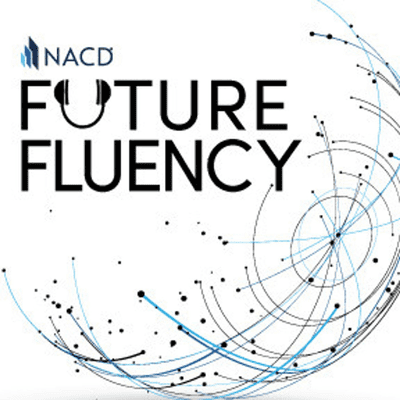
Future Fluency
Podcast by NACD
Future Fluency is a podcast series that challenges conventional thinking about the links between innovation, culture, the changing face of America, and what it means for business. We convene a wide range of perspectives—from neuroscientists and sociologists to those of authors and business leaders—to help make sense of how we think about diversity in this era of disruption. Hosted by Ashley Marchand Orme, Future Fluency is produced by the National Association of Corporate Directors.
Aloita 7 vrk maksuton tilaus
Kokeilun jälkeen 7,99 € / kuukausi.Peru milloin tahansa.
Kaikki jaksot
54 jaksotSpeaker Bios: * Maryanne Hancock: CEO of Y Analytics, the arm of TPG responsible for the impact and ESG mandates of the firm. Previously, Hancock spent ~20 years at McKinsey and Company, where she was a senior partner. * Melody Meyer: Director, BP, AbbVie, and National Oilwell Varco; President, Melody Meyer Energy LLC and Women with Energy LLC * Melissa Paschall: Director, Governance, Ceres Accelerator for Sustainable Capital Markets, Ceres
Speaker Bios: * Maryanne Hancock: CEO of Y Analytics, the arm of TPG responsible for the impact and ESG mandates of the firm. Previously, Hancock spent ~20 years at McKinsey and Company, where she was a senior partner. * Melody Meyer: Director, BP, AbbVie, and National Oilwell Varco; President, Melody Meyer Energy LLC and Women with Energy LLC * Melissa Paschall: Director, Governance, Ceres Accelerator for Sustainable Capital Markets, Ceres
FEATURED GUESTS Ram Charan Ram Charan is a world-renowned business consultant, author, and speaker who has spent the past 40 years working with many top companies, CEOs, and boards. Charan was first introduced to business while working in the family shoe shop in a small town in northern India, where he was raised. He served on the faculties of Harvard Business School and Northwestern University before pursuing consulting full-time. Charan has won several awards, including the Bell Ringer award at GE’s Crotonville Institute and best teacher award at Northwestern. He was among BusinessWeek‘s top ten resources for in-house executive development programs. Charan has authored more than 30 books since 1998 that have sold over four million copies in more than a dozen languages. He has also written for Harvard Business Review, Fortune, BusinessWeek, Time, Chief Executive, and USA Today. Charan is a Distinguished Fellow of the National Academy of Human Resources Judy Samuelson Judy Samuelson is founder and executive director of the Aspen Institute’s Business and Society Program and author of Six New Rules of Business: Creating Real Value in a Changing World (2021). Signature programs under Samuelson’s leadership include a 10-year campaign to disrupt Milton Friedman’s narrative about corporate purpose, the Aspen Principles of Long-Term Value Creation, and a partnership with Korn Ferry to rethink executive pay. She previously worked in legislative affairs in California and banking in New York’s garment center and ran the Ford Foundation’s office of program-related investments. Samuelson blogs for Quartz at Work. She is a Bellagio Fellow and a director of the Financial Health Network. Stilpon Nestor Stilpon Nestor is the executive chair of Morrow Sodali EMEA. He is also the executive chair and founder of Nestor Advisors, a company that Morrow Sodali acquired in early 2021. In this latter role, he has advised the boards of some of the largest companies and financial institutions in the European Union and emerging markets in Europe, Latin America, Asia, and the Middle East across a variety of sectors. Until 2002, Stilpon was the head of the Corporate Affairs Division at the OECD, leading the team which produced the OECD Principles of Corporate Governance in 1999. Stilpon is a nonexecutive director of the Arabian Construction Co., one of the largest contractors in the Gulf. He is currently a member of the UK Institute of Directors (IoD) Advisory Board on Corporate Governance and cochairs its working group on governance and technology. He is a regular public speaker on governance. Mike Lubrano Mike Lubrano is managing director of Valoris: Stewardship Catalysts, and an adjunct professor of Sustainable Finance and Impact Investment at Johns Hopkins School of Advanced International Studies in Washington, DC. Lubrano also teaches the International Corporate Governance Network’s signature “Governance, Stewardship, and Sustainability” course and served as ICGN’s Education Programme advisor. Lubrano was a cofounder and managing director, Corporate Governance and Sustainability, at Cartica Management LLC. Earlier, Lubrano worked at the International Finance Corporation (IFC), the private sector investment arm of the World Bank Group; served as advisor to the Ministry of Finance of Chile for the development of its corporate governance reforms; and was one of the group of experts that designed Brazil’s Novo Mercado. Lubrano is a cofounder of the Latin America Corporate Governance Roundtable. He is currently a director of FIBRA ECO. He is the coauthor of Governance, Stewardship and Sustainability (2021). SHOW NOTES mpact of Technology on the Future of Corporate Governance Ram Charan: Three factors every board must consider 1. Need to have a view of the outside world that is not purely driven by management. Need independent view of the outside 2. Technology: must focus is critical because a company cannot be everything to everyone. Must have the right CEO a 3. Capital Allocation: balance between short term and long term * Technology will be a critical driver of enabling a board to understand these three critical areas * Effective agenda setting to improve the effective time of board meetings Stilpon: Royal Post upgraded many of its digital systems. How can boards fully kick the tires on a reporting system that is fully algorithmic? Boards must be more generalist and with access to more information from the outside. * Technology will change employee participation in the boardroom. Judy Samuelson: Era of hyper transparency. Employees have good sightlines into business decision making and ability to follow the money in a way never previously possible. Authentic leadership is keeping your promises and outsiders and employees are now able to apply a level of scrutiny never previously possible with new technology. * Technology empowers employees to build consensus and communicate with each other in ways previously not available to other generations Judy Samuelson: Cultural barrier to employees represented on board. Employees have same long-term interest in the companies success. In the knowledge economy ignore them at your own peril. Employees are the centerpiece of the success of the business. How will the pandemic impact corporate governance moving forward: Ram Charan: Cycle time is reducing, communicating with competitors. 6 boards meetings for boards usually sometimes 4 Judy Samuelson: the pandemic ushered in a new era of private, public partnership * Total reshaping of executive compensation. Move away from stock in order to incentivize long-term interests and success. * “Cannot have a successful business in a failed society” Stilpon: Impacts the new “distributed board” era and will impact the agendas and consolidation of the agendas to allow for more deep diving into the issues during meetings, but less consequential stuff can be distributed to be completed outside of meetings. What knowledge and skills will future board members need? Stilpon: More well-rounded generalists rather than direct specialists on specific topics. Ram Charan: Many board members still don’t have the basic finance knowledge (balance sheets) Judy Samuelson: Need more women on boards and need more diversity Final Statements Ram Charan: Broaden focus but cannot focus solely on stakeholders, have the right CEO, focus the agenda every year, employees need to be rewarded in same way as top management to decrease inequality Stilpon Nestor: Companies will become much more social animals. Boards will be freed from the short-termism and be more strategic. Variable architecture in their composition, more distributed boards and distributed duties * Challenge: going to new social companies is lacking a complete and fulsome accountability structure to replace the shareholder accountability model Judy Samuelson: Shareholder accountability is not the solution. How will the culture of boards evolve? Status quo will not get us where we want to go. More diversity and supporting the executive to do some difficult and “unpopular” things.
FEATURED GUESTS Ram Charan Ram Charan is a world-renowned business consultant, author, and speaker who has spent the past 40 years working with many top companies, CEOs, and boards. Charan was first introduced to business while working in the family shoe shop in a small town in northern India, where he was raised. He served on the faculties of Harvard Business School and Northwestern University before pursuing consulting full-time. Charan has won several awards, including the Bell Ringer award at GE’s Crotonville Institute and best teacher award at Northwestern. He was among BusinessWeek‘s top ten resources for in-house executive development programs. Charan has authored more than 30 books since 1998 that have sold over four million copies in more than a dozen languages. He has also written for Harvard Business Review, Fortune, BusinessWeek, Time, Chief Executive, and USA Today. Charan is a Distinguished Fellow of the National Academy of Human Resources Judy Samuelson Judy Samuelson is founder and executive director of the Aspen Institute’s Business and Society Program and author of Six New Rules of Business: Creating Real Value in a Changing World (2021). Signature programs under Samuelson’s leadership include a 10-year campaign to disrupt Milton Friedman’s narrative about corporate purpose, the Aspen Principles of Long-Term Value Creation, and a partnership with Korn Ferry to rethink executive pay. She previously worked in legislative affairs in California and banking in New York’s garment center and ran the Ford Foundation’s office of program-related investments. Samuelson blogs for Quartz at Work. She is a Bellagio Fellow and a director of the Financial Health Network. Stilpon Nestor Stilpon Nestor is the executive chair of Morrow Sodali EMEA. He is also the executive chair and founder of Nestor Advisors, a company that Morrow Sodali acquired in early 2021. In this latter role, he has advised the boards of some of the largest companies and financial institutions in the European Union and emerging markets in Europe, Latin America, Asia, and the Middle East across a variety of sectors. Until 2002, Stilpon was the head of the Corporate Affairs Division at the OECD, leading the team which produced the OECD Principles of Corporate Governance in 1999. Stilpon is a nonexecutive director of the Arabian Construction Co., one of the largest contractors in the Gulf. He is currently a member of the UK Institute of Directors (IoD) Advisory Board on Corporate Governance and cochairs its working group on governance and technology. He is a regular public speaker on governance. Mike Lubrano Mike Lubrano is managing director of Valoris: Stewardship Catalysts, and an adjunct professor of Sustainable Finance and Impact Investment at Johns Hopkins School of Advanced International Studies in Washington, DC. Lubrano also teaches the International Corporate Governance Network’s signature “Governance, Stewardship, and Sustainability” course and served as ICGN’s Education Programme advisor. Lubrano was a cofounder and managing director, Corporate Governance and Sustainability, at Cartica Management LLC. Earlier, Lubrano worked at the International Finance Corporation (IFC), the private sector investment arm of the World Bank Group; served as advisor to the Ministry of Finance of Chile for the development of its corporate governance reforms; and was one of the group of experts that designed Brazil’s Novo Mercado. Lubrano is a cofounder of the Latin America Corporate Governance Roundtable. He is currently a director of FIBRA ECO. He is the coauthor of Governance, Stewardship and Sustainability (2021). SHOW NOTES Megatrends shaping corporate governance Judy Samuelson: Employees are changing the power structure * Much better window into corporate accountability than investors or management, or regulators Stilpon: Control of corporations is changing. Concentration of control with multiple voting rights, SPACs.2.) Much more voice outside of the company. Corporations are becoming much more social animals than economic animals (corporations are political actors).3.) Ebb and flow of regulation post 2008 Ram Charan: Public boards now have a new boss and the Engine #1 example is proof of that. The new boss is the long-term, permanent investor (passive, BlackRock, Vanguard, Atavists). Drivers: Sustainability and the new boss is 24/7 What is the effect of the debate of the purpose of the corporation Stilpon: Not quite sure that in spite of the UK CorpGov code and BRT announcement, not sure we have actually seen companies putting purpose into action, and it remains to be seen how companies will “hardwire” purpose into strategy, actions, and compensation incentives. * Could simply be a way of dodging accountability to shareholders by diluting the accountability across multiple stakeholder constituencies Ram Charan: Purpose goes back to Harvard Business school since the 1930s. India culturally practices giving 10% of profit to charity. Purpose has been practiced for decades and it merely means that the current efforts of social engagement are not enough. Judy Samuelson: Stakeholder is a bad term, but we need business to be at the table. The law around corporate purpose is not holding us back, but it is the system and infrastructure that keeps the shareholders at the top and front and center to business objectives. Employees are better at accountability than shareholders, and can better account for companies aligned to the promises and expectations set out in BRT. Strong focus on what the company is doing and producing tied to that purpose and what the effects it is having in doing and producing those things on the community it operates in? Derive purpose from this * 17:00: Moment of huge change with directors retiring in the new normal. We need new innovation at the level of governance. CEO must assess the entire ecosystem of the business, external and internal. Rethink committee structure, employees are not going to be quiet, companies are returning 90% of profits to shareholders in buybacks and dividends * Imminent and measurable: composition and diversity are improving but not there yet. 2.) increasing compensation between the top and the bottom, front line workers is untenable * Talking about how the business model works and what it is designed to do and then what is the impact in the real world of that model Stilpon: Skeptical, startup model with purpose is potentially a way towards instituting the purpose into the organization Large Companies – Is there a dichotomy between the bosses and players a large company has versus mid and small cap that are not high-profile (not as big targets for activists and passive investors) Judy Samuelson: Not sure. Capital is not scarce and many companies simply go public as a means of providing an early escape hatch for their early investors, but they do not actually need capital. * Large and small is not the right distinction. Focusing on culture and impact. Inequality needs to bring everyone to the table * Crisis is driving change. Larger companies as they are targeted as they provide a means of bringing the entire vendor, supply chain, and ecosystem to the table to drive change. Small is much more dynamic so it will be interesting to see how they impact this space Stilpon: Large companies are just engaged in a political communications exercise.
We’re pushing the pause button on the podcast for just a bit, but we’ll be back to cover the issues you care about. So subscribe and keep an eye out for more.
Aloita 7 vrk maksuton tilaus
Kokeilun jälkeen 7,99 € / kuukausi.Peru milloin tahansa.
Podimon podcastit
Mainoksista vapaa
Maksuttomat podcastit



















